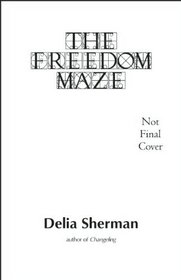THE FREEDOM MAZE is an odd and intriguing book, blending two historical periods with mystical elements. At its core, though, this is a traditional coming-of-age storywhich actually makes it hard for me to decide how I feel about this book.
In middle school, I read a book called The Devils Arithmetic by Jane Yolen, which tells the story of a modern girl who gets thrown back in time to WWII Europe. THE FREEDOM MAZE follows the same storypath. It is clear that Sherman has meticulously done her research on both time periods: the dialogue feels authentic, social beliefs ingrained, and details regarding setting extraordinary. Its hard enough accurately depicting one historical period; Delia Sherman has to make everyone look like underachievers by doing so for two!
All of that is the backdrop, however, for the classic bildungsroman structure of this story. THE FREEDOM MAZE involves slavery and racism and Southern culture, but its not interested in that so much as it is in Sophies development from a petulant child to a more independent teenager. And thats where my potential love for this book trips up. Sophie is sympathetic at the beginning of the novel, when she is ordered this way and that by her Southern belle mother and grandmother, but when half the book passes and Sophie is still petulant and incompetent, my sympathy for her waned a bit. Of course, it wouldnt be a bildungsroman if Sophie didnt eventually learn, but it was a bit of a struggle for me in the middle to continue to be invested in the well-being of a timid and fretful girl. Think Mary from The Secret Garden, thrust into the pre-Civil War American South.
THE FREEDOM MAZE is not a book for those who like their plots and pacing action-packed and always-running. I put the book down several times out of repetitiveness and Sophies stagnancy before I began to be invested. And while Im glad to have finished it, half of a book with a slow plot and fretful main character is still too much for me to like it fully. THE FREEDOM MAZE will be best for patient readers who like their readings challenging, well-researched, and with just a dash of the fantastical.
In middle school, I read a book called The Devils Arithmetic by Jane Yolen, which tells the story of a modern girl who gets thrown back in time to WWII Europe. THE FREEDOM MAZE follows the same storypath. It is clear that Sherman has meticulously done her research on both time periods: the dialogue feels authentic, social beliefs ingrained, and details regarding setting extraordinary. Its hard enough accurately depicting one historical period; Delia Sherman has to make everyone look like underachievers by doing so for two!
All of that is the backdrop, however, for the classic bildungsroman structure of this story. THE FREEDOM MAZE involves slavery and racism and Southern culture, but its not interested in that so much as it is in Sophies development from a petulant child to a more independent teenager. And thats where my potential love for this book trips up. Sophie is sympathetic at the beginning of the novel, when she is ordered this way and that by her Southern belle mother and grandmother, but when half the book passes and Sophie is still petulant and incompetent, my sympathy for her waned a bit. Of course, it wouldnt be a bildungsroman if Sophie didnt eventually learn, but it was a bit of a struggle for me in the middle to continue to be invested in the well-being of a timid and fretful girl. Think Mary from The Secret Garden, thrust into the pre-Civil War American South.
THE FREEDOM MAZE is not a book for those who like their plots and pacing action-packed and always-running. I put the book down several times out of repetitiveness and Sophies stagnancy before I began to be invested. And while Im glad to have finished it, half of a book with a slow plot and fretful main character is still too much for me to like it fully. THE FREEDOM MAZE will be best for patient readers who like their readings challenging, well-researched, and with just a dash of the fantastical.




